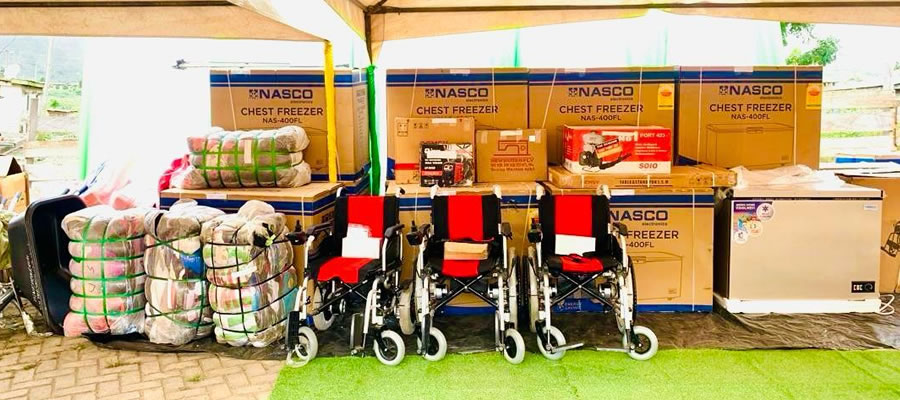

PREPARATION OF DISTRICT COMPOSITE ANNUAL ACTION PLANS
Introduction
The Composite Programme of Action which is designed to cover a period of four years (2018-2021) must be further simplified into various years to specify the activities that will be undertaken within each year of the plan period. This helps the Planner, the implementing agencies and other stakeholders to know what is happening at each point in the planning cycle. It also serves as a guide for monitoring the progress of the Medium term Development Plan. Annual Action Plans are annual breakdown of the Medium Term Development Plan. The rationale behind this is to identify which activities must be implemented before others especially on-going programmes and projects so that the overall impact of the plan can be felt. This is also necessary since resources are scarce and not all the proposed activities can be undertaken at the same time. It is also worth noting that some activities serve as inputs for other activities while others provide the basis for implementation of others. These reasons among others justify the preparation of Annual Action Plans.
Implementation Schedules for the District Composite Annual Action Plans The Annual Plan Implementation schedules are divided into four (4) quarters from January to December in each year. It indicates the various activities and project location to be undertaken in each year of the plan period (2018-2021), the time frame with respect to quarters, the annual budget and implementing agencies. The table below represents the District Composite Annual Action Plans for the various years of the plan period.
District Composite Annual Action Plans
Table 5.1: District Composite Annual Action Plan for 2018
Linking the District Annual Composite Budget with the District Development Plan
The budget as a tool allocates financial resources for the implementation of the DMTDP (2018 -2021) and as such links to the achievement of the objectives of the development plan. The Medium-Term Expenditure Framework (MTEF) provides for integration the recurrent and development budget by distinguishing the running cost of the District Assembly from the activities to which the District Assembly is set up to do. It is categorized into the following:
- Personal emoluments (relating to salary and wages and related allowances paid to established and non- established post by the District Assembly)
- Administration Activities- mainly relating to the running of the administration of the district (eg. Travelling and transport, telecommunication, postal charges, stationery, utilities-water, electricity, etc.)
- Services Activities- Services provided by the DAs to the people in the District (e.g. provision of health care services, education, community development, sanitation, public education, training, consultancies, etc)
- Investment Activities (e.g. construction of school blocks, provision of furniture, bore holes, office blocks, purchase of equipment, computers, vehicles and other capital goods).
Implementation of Annual Action Plans
The Implementation of the Annual Action Plans indicates the arrangements put in place for the implementation of the plan. Implementation of the plan has been designed to include all stakeholders in the District. The central focus of the implementation rests in the hands of the District Planning Coordinating Unit. However, stakeholders like the various Departments of the Assembly, Civil Societies and Non-Governmental Organisations, Community Members, Development Partners and the Central Government have respective roles in the implementation of the development plan.
Adoption of Draft DMTDP (2018-2021)
A final Public Hearing was convened for the public after the development plan had been successfully completed. The essence of the hearing was to enable the public deliberate on programmes and projects that had been embodied in the plan document. The hearing was also to give the opportunity to all manner of persons who have a stake in the development of the district to either criticize the document, make modifications or comments before the final submission of the draft document to the National Development Planning Commission (NDPC). This measure was to ensure community participation in the preparation of the plan document and much more ensure that the people owned the development plan.
Following the final public hearing, the plan was presented to the General Assembly for adoption. The Draft DMTDP (2018-2021) was subsequently adopted as the legitimate Blue print for Development Policy direction for Obuasi East District Assembly for the period 2018-2021.
IMPLEMENTATION, MONITORING AND EVALUATION
Introduction
In the implementation of the DMTDP, 2018-2021, Monitoring and Evaluation is regarded as vital to ensure transparency and accountability, and also to assess the extent of achievement of the plan objectives. Moreover, an effective M&E reporting practices will guide, facilitate and co-ordinate the execution of the projects and activities. This section of the report deals with the monitoring and evaluation of Obuasi East District Medium Term Development Plan (2018-2021). It is extremely important to institute measures to keep track of and assess the implementation and management of the development projects. Monitoring and Evaluation are critical component of the planning process and the last stage in the process. It also forms an integral part of management information system thereby making re-planning easier. Monitoring provides inputs into internal reporting systems with the aim of enhancing co-ordination, permitting problems to be anticipated at early stages and taking corrective actions and putting forward suggestions to eliminate problems and bottlenecks during project implementation.
In view of the above, the purpose of M&E is to:
· Provide a platform for all stakeholders to be actively involved in the development process
· Provide programme or project management staff and other stakeholders with information on whether progress is being made towards achieving a stated goal.
· Assist the DPCU to conduct quarterly performance reviews with other stakeholders
· Guide and regulate periodic project site inspections · Define indicators for measuring change on livelihood patterns
· Collect and collate feedback from the sub-district levels for the preparation of Annual Progress Report (APR) · Provide regular feedback to enhance learning and to improve the planning process and effectiveness of interventions.
· Improve service delivery and influence allocation of resources and show results as part of Accountability and Transparency
· Determine the extent to which project interventions are successful in terms of their impact and sustainability of their results.
Monitoring
Monitoring is a valuable management and a learning tool for effective development of projects and programmes. It is aimed at improving the efficiency and effectiveness of a project and programme. It is based on targets set and activities planned during the planning phases of work. It is a control mechanism which limits the level of deviation and keeps the implementation of projects on track. It is concerned with ensuring that the implementation of the projects outlined in the plan is executed as planned. It involves checking to make sure that the work is progressing in a manner acceptable to all stakeholders involved in the implementation. Monitoring is a necessary component of plan implementation because unforeseen changes in the socio-economic- situation of the district, political situation of the country and international relation could enable the necessary adjustments to be made at the right time.
Monitoring Matrix/Results Framework
A monitoring matrix is a table that links goals and objectives to indicators and targets. It also classifies the indicators types (input, output, outcome or impact) and shows baseline data for each indicator, the data sources and frequency of monitoring the indicators. It further shows who is responsible for collecting the monitoring data of each indicator.
ECONOMIC DEVELOPMENT Table 6.1:
Monitoring Matrix/Results Framework
Date Created : 6/2/2023 12:00:00 AM












 facebook
facebook
 X
X
 Youtube
Youtube
 instagram
instagram
 +233 593 831 280
+233 593 831 280 0800 430 430
0800 430 430 GPS: GE-231-4383
GPS: GE-231-4383 info@ghanadistricts.com
info@ghanadistricts.com Box GP1044, Accra, Ghana
Box GP1044, Accra, Ghana